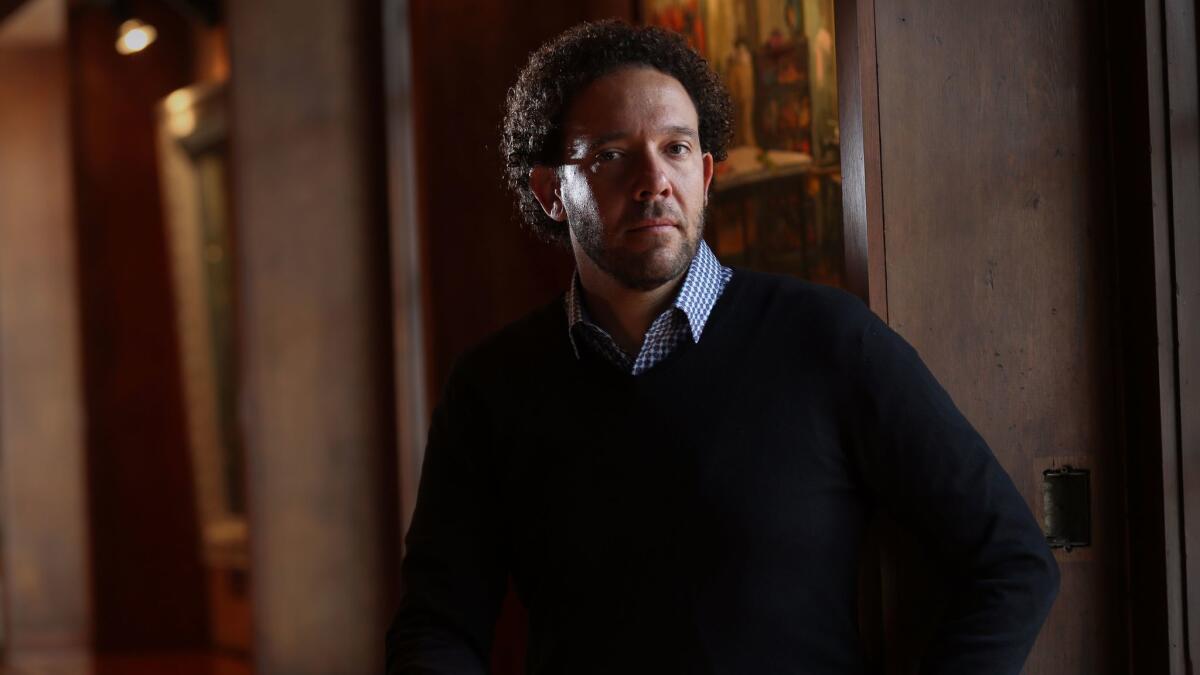Deaf West artistic director David Kurs: Why deaf actors should be cast to play deaf characters

- Share via
Deaf West Theatre was created by the deaf community as a place where deaf actors could come together with hearing actors in service of vivid theater. The company’s productions of “Big River” and “Spring Awakening” went on to Broadway, and its “Our Town” will be staged at the Pasadena Playhouse in the fall.
Deaf West Artistic Director David Kurs recently explained the importance of visibility for deaf actors, and in this edited conversation conducted by email, he offered his argument for why they should be given an opportunity to play deaf roles.
How important is authenticity in casting to deaf actors?
When a deaf actor is not cast in a deaf or signing role, an opportunity is taken away from a person who has the life experience of being deaf.
Each instance of a hearing actor playing deaf is grist for the Deaf West mill. We find ourselves increasingly motivated to create more opportunities for deaf actors, to create our own homegrown stars and to feed the talent factory with trained actors. We must continue to set an example so that others may learn from it.
Deaf actors realize, perhaps subconsciously, that appearing on stage is the repudiation of the advice to their hearing parents when their child was born — that the child was deficient and needed to be fixed. Appearing on stage and signing in front of a paying audience is the personal affirmation of the deaf identity over pathology.
The deaf community understands that our social and political standing as a community depends in large part upon representations of deaf people in media and the arts. Theater, film and performance have become essential means of expression and a key driver of standing for our community.
Are deaf actors getting more opportunity to be represented in theater?
Our Broadway production of “Spring Awakening” in 2015-2016 inspired multiple instances of casting deaf and disabled actors. We showed theater makers that our craft could be heightened through the simple principle of inclusion. In our production, Ali Stroker became the first person in a wheelchair to appear on Broadway.
On the other hand, it is my impression that theater makers will celebrate the artistry and accomplishments of Deaf West, but that the work we do does not make very many other companies want to create inclusive theater. I mean, that’s fine — we’ll continue to fill that niche — but I think that what we do is seen as too artistically risky for other companies to take on.
Do you think more opportunities for deaf playwrights could result in better representation for deaf culture?
Definitely. You also have to take in consideration the paucity of deaf playwrights: Mainstream theater is not an art form that is normally made accessible to our community. There is a need for a real infrastructure that will find and nurture new voices from within our community so that they may compete on a level playing field. I would like to create an environment where deaf writers pound out original plays and musicals on camera, in our first language, American Sign Language (ASL), without having ever touched a pen.
What is Deaf West doing to address the challenges faced by deaf theater professionals?
We strive not just to make theater with deaf people but to make good theater. For years, our work has torn down barriers of culture and language in the service of a higher truth in storytelling. While we serve the large population of deaf people in the metropolitan Los Angeles community, we also aim to increase the stature of deaf actors nationwide because we feel that increased media representation of deaf people is directly tied to the position of the deaf community in the world.
I’ve been having this conversation as an artist for a long time and I have come to take the long view that our work is just beginning and that we are laying the tracks for deaf actors to come. History tells me, however, that the pendulum will swing to the other side and the cycle to make inclusion a trending topic will begin anew.
In a brave new world where social media holds increased sway over audiences and motivates young individuals to create art with their smartphones, I have no doubt that we will see more casting of actors with disabilities.
What do you hope the future holds for the conversation about authenticity in casting?
Theater is a remarkably effective vehicle for illuminating the hidden margins of our world. Increased inclusion in our field also propels our profession toward new artistic heights: Deaf West’s track record of success as a theater company is tied to the new meanings that sign language, deaf culture, our stagings and actors bring to the material. It is our belief that these selling points will make theatergoers more aware and motivate theater makers to stage work that values authenticity and involves deaf people at all levels of the process.
AUTHENTICITY IN CASTING:
From “colorblind” to “color-conscious,” the new rules are anything but black and white
Timeline: 200 years of authenticity (or lack thereof)
#Protest: How the authenticity debate has played out in social media
Stuck on the sidelines: One transgender actress’ story
Perspective: A call for change
More to Read
The biggest entertainment stories
Get our big stories about Hollywood, film, television, music, arts, culture and more right in your inbox as soon as they publish.
You may occasionally receive promotional content from the Los Angeles Times.











